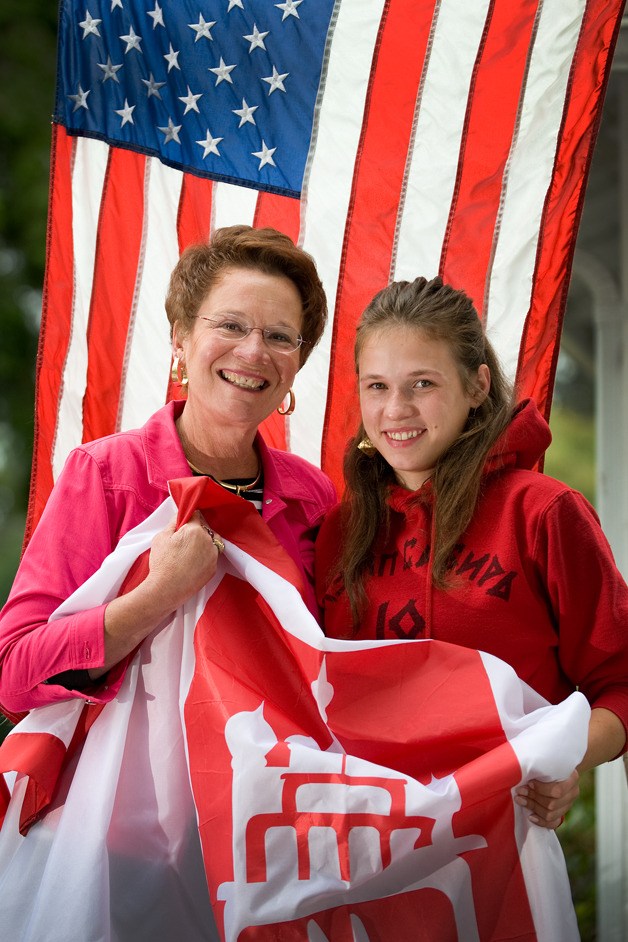By JENNEKE OOSTMAN
For the Review
Bainbridge Island’s Camp Siberia, an exchange program between American High School students and Russian orphans, is celebrating a decade of successful hard work and achievement.
Through smiles, love, laughter and a little dedication, the island youth involved help empower Russian orphans with positive childhood experiences.
Although the American and Russian youth do not share a common language, they still manage to form close emotional bonds during this short, annual summer camp program. The intimate relationships between the American and Russian children enable the orphans to gain a newfound sense of hope, as they recognize, often for the first time, the power of being loved.
“It changed my life a lot because I was only 15 when I began to work for Camp Siberia,” said Nika Nikatina, 17, a Russian orphan and camper who is currently visiting Bainbridge Island and staying with her counselor, 17-year-old Carolyne Reis via the exchange program. Nikatina has been a big help at Camp Siberia because she can fluently read and speak English.
Founded by Bainbridge Island resident Janie Ekberg, Camp Siberia has been actively supporting charitable causes, breaking down cultural barriers, and encouraging Bainbridge’s youth to take an educational, hands-on approach to involvement in the outside world since 1999.
Located in Novosibirsk, Russia, the camp provides Russian orphans with positive, emotionally constructive, interaction with their American peers. Additionally, it also teaches the orphans basic life skills necessary to function on their own, and assists in providing them with scholarships to complete higher academic and vocational training.
Annually, approximately 50 Bainbridge High School sophomores and juniors apply to become counselors for Camp Siberia. After an intense decision-making process, 18 of the applicants are carefully selected based upon their application, an interview, references and peer and board reviews.
The qualifying high school students are notified of their acceptance in late November, nearly seven months before they begin their journey to Russia as camp counselors.
Monthly meetings are held to help the counselors prepare for this life-changing experience. The meetings focus on raising funds, as well as “community service, training and team building.”
The trip costs roughly $4,500 for each of the student counselors, who raise the money via donations.
“This year was the hardest year for the kids to raise the money because of the economy,” said Ekberg, who believes fundraising for the trip is a critical element in the overall experience.
The actual journey, which typically begins the first Monday after the Fourth of July, includes touring Moscow and St. Petersburg. The tour enables them to experience Russian history and culture, including Red Square, the Kremlin, the Hermitage and the Summer Palace.
The counselors then fly overnight to Novosibirsk, where they spend the remainder of the trip bonding with the orphans. Each counselor is assigned to their own “camper” or orphan. The campers, who are chosen by the orphanages’ staff based on good behavior, range from ages 5 to 17.
The students know very little Russian upon embarking on their journey, and most of their Russian counterparts cannot speak English, so it is not uncommon for the counselor and camper to avoid direct verbal communication.
“It’s an emotional and physical connection, rather than a verbal one,” Reis said.
One-on-one bonding between the orphans and the students occurs via traditional American summer camp activities, including games, arts and crafts projects, sports, music and hiking.
“It’s physically and emotionally very challenging,” Reis said. “You have to turn on the energy from the second you wake up.”
Because of the verbal barrier, the American students often learn about the orphans’ pasts from the orphanage.
“It’s really sad to hear their stories,” said Jake Mallove, 19, a previous camp counselor.
The majority of the orphans have living parents; however, in most cases, authorities have taken away the parents’ rights.
“After hearing their stories, you can’t imagine [that] it is possible for them to survive. When you see them smile, you have reached the top,” said Nikatina.
The summer exchange program has generated more than just success within the Russian community. All three of the Bainbridge Island Camp Siberia counselor interviewees, Reis, Mallove and Fiona Stanton, agreed that the experience gave them a greater appreciation for their own lives, childhoods and parents.
“It made me more compassionate to the people in my life,” Reis said.
“It’s just such an eye-opener to outside of Bainbridge,” Mallove said. “There’s a Bainbridge bubble and most people are stuck in it.”
Ekberg, who is proud of the program’s success, enjoys watching new students blossom each year from the experience.
“They [the counselors] put their entire hearts into it,” Ekberg said. “It’s touching to see this magic happen.”


